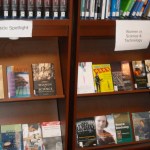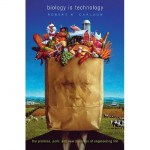Free Thought
My uncle describes Costco as the place "where you go broke saving money". That certainly describes my experience of the warehouse store - I walk in for some toilet paper and leave with a new television, a tub of cashews and a lifetime supply of chapstick. ABC News recently had an interesting profile of the retail company:
Costco's membership is largely made up of middle- and upper-middle class families and small business owners who pay $50 to $100 for annual memberships. So far this year, Costco has reported $386 million in revenues from membership fees alone.
Loyal customers are willing to…
I'm here at The Informationist: Collaboration between scientists and librarians to support informatics research at the Embassy Suites in DC. It's sponsored by Elsevier as part of their Research Connect series.
(stream of consciousness)
Dr John L Schnase, NASA - Science and technology challenges of eco-informatics
Workshop 10 years ago about research directions in biodiversity and ecosystem informatics. Summary and paper in Information Systems (maybe this: doi:10.1007/s10844-006-0027-7). Stream of logic: striking feature of planet is its life, striking feature of life is its biodiversity. More…
Now that the 2009 edition of Open Laboratory, the fourth annual anthology of the best writing on science blogs, is out and getting the first (very positive!) reviews on blog and in the media, it's time to start looking ahead at the next year.
Yesterday I cleaned up the submission form, made the necessary edits, and opened it up - please go to the new Submission Form and start entering the posts you consider worthy of publishing in the book.
Each entry needs to be originally published as a blog post between December 1st 2009 and December 1st 2010 to be eligible.
You can nominate as many…
Wednesday was Ada Lovelace Day!
Ada Lovelace Day is an international day of blogging to celebrate the achievements of women in technology and science.
The first Ada Lovelace Day was held on 24th march 2009 and was a huge success. It attracted nearly 2000 signatories to the pledge and 2000 more people who signed up on Facebook. Over 1200 people added their post URL to the Ada Lovelace Day 2009 mash-up. The day itself was covered by BBC News Channel, BBC.co.uk, Radio 5 Live, The Guardian, The Telegraph, The Metro, Computer Weekly, and VNUnet, as well as hundreds of blogs worldwide.
In 2010 Ada…
This is my blog post for Ada Lovelace Day, on which we celebrate technical achievement by women. I'm writing it the day before, and setting it to post at midnight.
I hope someone is writing a biography of Henriette Avram. I will be first in line to buy it. I desperately want to know how she did what she did.
Her achievement is generally, and appropriately, recognized as a technical one: designer and implementer of the MARC (MAchine Readable Cataloging) format still in use in hundreds of thousands of libraries worldwide. If that had been all: dayenu, it would have been enough. For all its…
As I've mentioned before, I've been spending a lot of time working on a book.
Initially, I was working on a book made up of a collection of material from blog posts;
along the way, I got diverted, and ended up writing a book about cloud computing using
Google's AppEngine tools. The book isn't finished, but my publisher, the Pragmatic Programmers,
have a program that they call beta books. Once a book is roughly 60% done, you
can buy it at a discount, and download drafts electronically immediately. As more sections
get done, you can download each new version. And when the book is finally…
An interesting and provocative article in The Scientist by Steven Wiley iof the Environmental Molecular Sciences Laboratory, To Join or Not to Join.
The thrust of the article is that scholarly societies are having trouble offering true value to their members in the Internet age, that their business models and even their raisons d'etre are being disrupted.
In years past, the answer was easy because being a member came with tangible benefits, such as inexpensive journals and the ability to submit abstracts to annual meetings. Nowadays, these perks don't seem very important. Most society…
The APS March meeting is next week as 10000 physicists invade Portland, Oregon. I hope Powell's bookstore has stocked their science sections well! GQI, the topical group on quantum information, sponsors a good number of sessions at the meeting including sessions with invited talks, focus sessions, and general sessions. Below the fold I'm assembling a list of quantum computing sessions, but before the fold I'd like to point out the invited sessions, which have longer speaking slots where one can actually learn more than the speakers name and research project title, that are sponsored or…
A theoretical condensed matter postdoc of interest to the quantum computing folks:
Postdoctoral Research Fellow in Theoretical Condensed Matter and Quantum Information Science at the Laboratory for Physical Sciences, University of Maryland.
Applications are being accepted for physics postdoctoral research positions in quantum information and device theory at the Laboratory for Physical Sciences (LPS) at the University of Maryland-College Park. Demonstrated expertise in one or more of the following categories is desired: semiconductor/condensed-matter physics, solid-state quantum computing (e…
This was originally posted 1/9/2009 on my old blog.
Due to popular demand (well 3 requests :) ), this is a commentary and additional information for my conference paper and presentation: Pikas, C. K. (2008). Detecting Communities in Science Blogs. Paper presented at eScience '08. IEEE Fourth International Conference on eScience, 2008. Indianapolis. 95-102. doi:10.1109/eScience.2008.30 (available in IEEE Xplore to institutional subscribers) [also self-archived - free!- here]
The presentation is embedded in another blog post, and is available online at SlideShare. The video of me talking…
Merry Tuesday. Links for you. Science:
95 per cent chance that Man is to blame for global warming, say scientists
6 reasons why the iPad could be the 'Star Wars' of tablet computing
Natural Advantage
Other:
What Adam Smith Actually Identified as the Appropriate Roles for 18-century Governments
The Wrong Kind of Green
On the need for grownups
Right wing populism: simple, stupid
Fannie and Freddie Start Returning Fraudulent Mortgages to Banks, But Crime Goes Unpunished
How Sports Attacks Public Education
Yesterday was International Women's Day and since I'm a firm believer in International Better Late Than Never Day, I thought I thought I'd add my little contribution to the celebration. Or at least highlight a great post from someone else.
Computer Scientist Amy Csizmar Dalal's recent blog post Does Barbie's career matter? has some great things to say about the importance of role models and positive examples for girls who might be interested in scientific or technical careers:
I was a somewhat normal (don't laugh too hard) but nerdy kid growing up who loved math and science. And while I had…
I'm in Urbana-Champaign this weekend to teach an in-person day for my online collection-development class. I'm looking forward to it; every time I teach I am reminded that students are smarter than I am.
For now, tidbits!
As world plus dog probably knows already, The Economist tackled the data deluge.
Adam Christensen gives us the modest, unassuming Data. The foundation for everything on an intelligent, interconnected, instrumented planet.
Rethinking scholarly communication from the ground up: SciBling John Dupuis asks Are computing journals too slow? and Dan Cohen muses about how best to…
Thomson Reuter's website Sciencewatch.com has a special section out on citation and paper data for the last ten years of quantum computing. More below the fold.
The first interesting thing that everyone wants to know about such list is, of course, "who's number 1?!?" Well the most cited paper over the last 10 years according to this survey was "A scheme for efficient quantum computation with linear optics" by Knill, Laflamme, and Milburn (Nature, 409, 46-52 (2001)). Not too surprising given that this paper established a completely new method for building a quantum computer and, equally…
Today Microsoft CEO Steve Ballmer spoke at the University of Washington in the Microsoft Atrium of the Computer Science & Engineering department's Paul Allen Center. As you can tell from that first sentence UW and Microsoft have long had very tight connections. Indeed, perhaps the smartest thing the UW has ever done was, when they caught two kids using their computers they didn't call the police, but instead ended up giving them access to those computers. I like to think that all the benefit$ that UW has gotten from Microsoft are a great big karmic kickback for the enlightened sense of…
Continuing the ongoing discussion about the publication habits of computing researchers that I've recently blogged about:
Time for computer science to grow up?
ACM responds to the blogosphere
The Association for Computing Machinery on Open Access.
Conferences vs. journals in computing research
This time around, we have Moshe Vardi Revisiting the Publication Culture in Computing Research in the latest Communications of the ACM.
The May 2009 editorial and the August 2009 column attracted a lot of attention in the blogosphere. The reaction has been mostly sympathetic to the point of view…
A set of special commemorative stamps is being launched today to celebrate the 350th anniversary of the Royal Society. The stamps feature ten of the most prominent historical fellows, as chosen by leading figures in the society today.
How many can you name? Answers below the fold!
Each scientist is displayed with an image representing their contribution to the world. The fellows, and the field of their acheivement, are as follows:
Robert Boyle - Chemistry
Sir Isaac Newton - Optics
Benjamin Franklin - Electricity
Edward Jenner - Vaccination
Charles Babbage - Computing
Alfred Russell…
Oh look! Another Jonathan Leake story
Performing two Google searches from a desktop computer can generate about the same amount of carbon dioxide as boiling a kettle for a cup of tea, according to new research.
While millions of people tap into Google without considering the environment, a typical search generates about 7g of CO2 Boiling a kettle generates about 15g. "Google operates huge data centres around the world that consume a great deal of power," said Alex Wissner-Gross, a Harvard University physicist whose research on the environmental impact of computing is due out soon. "A Google…
I'm home sick today, and not precisely looking forward to giving my class tonight because I really do feel wiped out. Fortunately, tidbits posts are easy…
Denmark ponders the future of the research library. A thoughtful read for librarians; a good skim for scientists wondering how libraries will help them in future.
Congratulations to Galaxy Zoo for its first published paper based on crowdsourced galaxy-classification data. May there be many more!
Code is data too, says Chris Wiggins, arguing that you can't really judge results until you know what's been done to the data.
An Economic…
"The history of any given technology is extraordinarily complex."
--Rob Carlson, Biology is Technology.
Analyzing the history of a technology requires a complex look at the social, economic, and political context in which it emerged, and the reciprocal influences that the developing technology exerts on these factors. Predicting what the future of a technology will be like, how it will affect the economy and understanding the potential risks and payoffs is much much harder. Rob Carlson's new book, Biology is Technology: The Promise, Peril, and New Business of…


